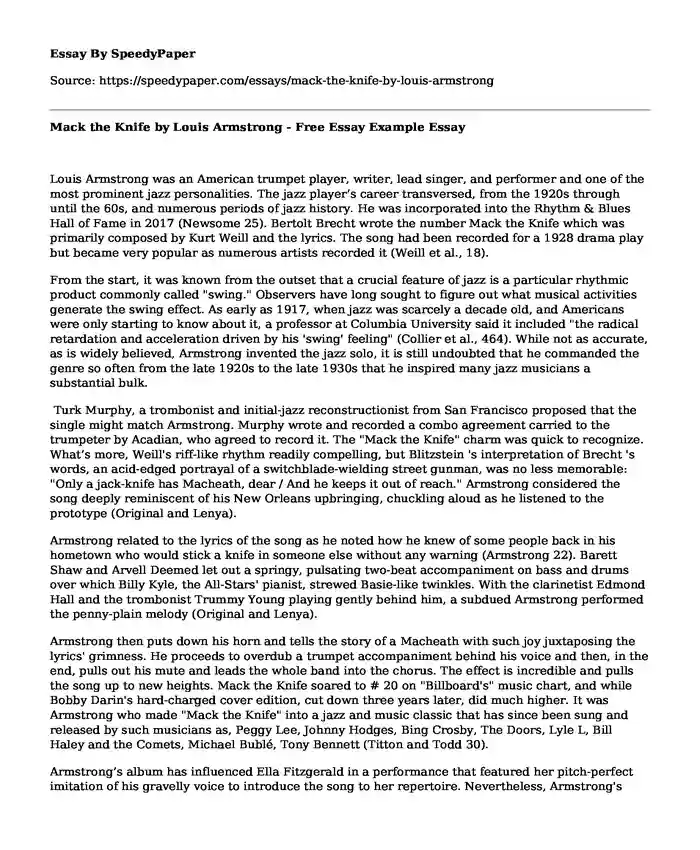
| Type of paper: | Essay |
| Categories: | Music Culture Inspiration Essays by pagecount |
| Pages: | 4 |
| Wordcount: | 850 words |
Louis Armstrong was an American trumpet player, writer, lead singer, and performer and one of the most prominent jazz personalities. The jazz player’s career transversed, from the 1920s through until the 60s, and numerous periods of jazz history. He was incorporated into the Rhythm & Blues Hall of Fame in 2017 (Newsome 25). Bertolt Brecht wrote the number Mack the Knife which was primarily composed by Kurt Weill and the lyrics. The song had been recorded for a 1928 drama play but became very popular as numerous artists recorded it (Weill et al., 18).
From the start, it was known from the outset that a crucial feature of jazz is a particular rhythmic product commonly called "swing." Observers have long sought to figure out what musical activities generate the swing effect. As early as 1917, when jazz was scarcely a decade old, and Americans were only starting to know about it, a professor at Columbia University said it included "the radical retardation and acceleration driven by his 'swing' feeling" (Collier et al., 464). While not as accurate, as is widely believed, Armstrong invented the jazz solo, it is still undoubted that he commanded the genre so often from the late 1920s to the late 1930s that he inspired many jazz musicians a substantial bulk.
Turk Murphy, a trombonist and initial-jazz reconstructionist from San Francisco proposed that the single might match Armstrong. Murphy wrote and recorded a combo agreement carried to the trumpeter by Acadian, who agreed to record it. The "Mack the Knife" charm was quick to recognize. What’s more, Weill's riff-like rhythm readily compelling, but Blitzstein 's interpretation of Brecht 's words, an acid-edged portrayal of a switchblade-wielding street gunman, was no less memorable: "Only a jack-knife has Macheath, dear / And he keeps it out of reach." Armstrong considered the song deeply reminiscent of his New Orleans upbringing, chuckling aloud as he listened to the prototype (Original and Lenya).
Armstrong related to the lyrics of the song as he noted how he knew of some people back in his hometown who would stick a knife in someone else without any warning (Armstrong 22). Barett Shaw and Arvell Deemed let out a springy, pulsating two-beat accompaniment on bass and drums over which Billy Kyle, the All-Stars' pianist, strewed Basie-like twinkles. With the clarinetist Edmond Hall and the trombonist Trummy Young playing gently behind him, a subdued Armstrong performed the penny-plain melody (Original and Lenya).
Armstrong then puts down his horn and tells the story of a Macheath with such joy juxtaposing the lyrics' grimness. He proceeds to overdub a trumpet accompaniment behind his voice and then, in the end, pulls out his mute and leads the whole band into the chorus. The effect is incredible and pulls the song up to new heights. Mack the Knife soared to # 20 on "Billboard's" music chart, and while Bobby Darin's hard-charged cover edition, cut down three years later, did much higher. It was Armstrong who made "Mack the Knife" into a jazz and music classic that has since been sung and released by such musicians as, Peggy Lee, Johnny Hodges, Bing Crosby, The Doors, Lyle L, Bill Haley and the Comets, Michael Bublé, Tony Bennett (Titton and Todd 30).
Armstrong’s album has influenced Ella Fitzgerald in a performance that featured her pitch-perfect imitation of his gravelly voice to introduce the song to her repertoire. Nevertheless, Armstrong's depiction continues ab initio, a classic example of his extraordinary power to acquire and create his unlikely-sounding music (Collier 277). The jazz genius had made the foreign song his won as he was able to relate to it and in this way created a unique sound that distinguished it from the original.
Works Cited
Armstrong, Louis. Louis Armstrong, in his own words: selected writings. Oxford University Press, USA, 2001.
Top of Form
Collier, James L. Louis Armstrong, an American Genius. New York: Oxford University Press, 1983.Bottom of Form
Collier, Geoffrey L., and James Lincoln Collier. "A study of timing in two Louis Armstrong solos." Music Perception 19.3 (2002): 463-483.
Newsome, J. (2017). Louis Armstrong: Jazz Musician. Cavendish Square Publishing, LLC. https://books.google.co.ke/books?hl=en&lr=&id=wipmDwAAQBAJ&oi=fnd&pg=PP1&dq=louis+armstrong&ots=Ay_vt2B1WF&sig=Lh50VUuC9J65X1RrrZ3b7JaSm3Y&redir_esc=y#v=onepage&q=louis%20armstrong&f=false
Original, Louis, and Lotte Lenya. “Mack the Knife”-Louis Armstrong (1956) Added to the National Registry: 2015 Essay by Terry Teachout (Guest Post)*. https://www.loc.gov/static/programs/national-recording-preservation-board/documents/MackTheKnife.pdf
Tipton, Jeff Todd. Early downhome blues: A musical and cultural analysis. UNC Press Books, 2014.https://books.google.co.ke/books?hl=en&lr=&id=yPKlxdCBmk0C&oi=fnd&pg=PR9&dq=louis+armstrong+mack+the+knife+analysis&ots=-m_qI0KRfU&sig=vrXQZ-0WVtFQuEpAGmjUGA45pPQ&redir_esc=y#v=onepage&q&f=false
Weill, Kurt, Bertolt Brecht, and Marc Blitzstein. "The Ballad Of Mack The Knife (1954 Original Broadway Cast)." (2017). https://najculture.org/handle/20.500.11976/100
Cite this page
Mack the Knife by Louis Armstrong - Free Essay Example. (2023, Sep 18). Retrieved from https://speedypaper.net/essays/mack-the-knife-by-louis-armstrong
Request Removal
If you are the original author of this essay and no longer wish to have it published on the SpeedyPaper website, please click below to request its removal:
- Free Essay Sample on Organizational Psychology
- Essay Example Dedicated to Forensic Software Automated Reports
- Essay Sample Dedicated to the Intervention of Diabetes in Adults
- Reflection Essay Example: The Tale of Sinuhe
- Essay Example: Crime or Deviant Behavior
- Theory of Forms Essay Sample
- Essay Example on Why Drugs Should Never Be Legalized
Popular categories




